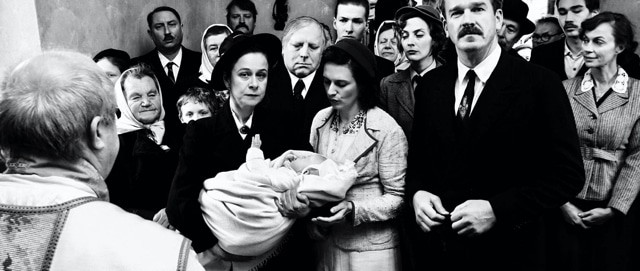




Dir.: Bohdan Slama; Cast: Magdalena Borova, Stanislav Majer, Csongor Kassai, Denisa Bresova, Robert Miklus, Petra Spalkova, Marie Ludvikova, Jiri Cerny; Czech Republic 2020, 135′.
In this stark but illuminating drama Bohdan Slama chronicles the longterm social consequences of “ethnic cleansing” in a Czechoslovakian village near the Austrian border from the 1930s until the late 1950s.
German”Sudetenland’, as it was known at the time, consisted of about three million people who lived under German occupation during 1938/9. German became the official language – although Czech remained the lingua franca. Seventy five percent of the Jewish population (around 590,000) was exterminated by the occupying forces and their Czech collaborators, property was confiscated, along with that of the Czech inhabitants. As one villager puts it, in his lifetime, he lived in 3 different countries without moving house
 In 1943, the Allies made plans for several million Germans to leave the country, a process that took nearly three years. But as the War came to an end in 1945, over 60,000 were Germans were forcibly evicted by Czechs, some even killed with the silent consent of the government and political parties across the board. .
In 1943, the Allies made plans for several million Germans to leave the country, a process that took nearly three years. But as the War came to an end in 1945, over 60,000 were Germans were forcibly evicted by Czechs, some even killed with the silent consent of the government and political parties across the board. .
The famous Singer Sewing machine becomes the symbol for these tortured events from the late 1930s onwards. Given to a couple at the christening of their new-born child, it will change hands often before being discarded the the rubbish in the end. Ivan Arsenyev’s script follows a married couple: Marie Veberova (Borova) is Czech and her German husband, Veber, is a trader. In order not to attract attention to themselves many Czech citizens ‘forget’ their language. Jews are required to leave, their property is ‘shared’ with the remaining, often well-off, Czechs. Resistance is sparse, only Joseph Pachl (Kassai) and a few others try to arm themselves against their enemies. Pachl is soon arrested and sent to a concentration camp. Life in the village changes completely: an previously innocuous woman discovers her love of Fascism, forcing her school kids to sing the Nazi youth hymn “Unsere Fahne flattert uns voran”. Veber and others look after Joseph’s daughter, Zdena Pachlova, but take her property in payment.
Essentially an account of how ordinary people respond to these changing circumstances with all the contingent ideological and racial implications involved this is a deeply affecting film that avoids melodrama or a sentimental approach, drawing comparisons with recent outings on a similar themes such as The Painted Bird and Charlatan.
Several years in the making, the Slama works with a cast of actors and non-pros drawing on real incidents without creating a drama documentary; the film focuses on a collection of characters showing how divisions are rife. Petty thieving becomes the order of the day, everyone stealing from their neighbours. Symbolically, one old woman steals three cups from her recently departed neighbours. When they return after the end of the war, she shamelessly returns them with the comment “I wanted to have something to remember you by”.
The end of the Nazi occupation has dire consequences for those who have collaborated. The woman who led the singing is raped, and Pachl, who has returned more dead than alive from the camps, is put in charge of the community. Later, soldiers make him responsible for a ‘show trial’ against a group of collaborators, amongst them is Veber. The victims are forced to dig their own graves. Pachl is later appalled by what he has done, and is accused of making the trial into a shambolic farce by the authorities.
With his use of 35 mm real film stock, DoP Divis Marek ensures unmitigated bleakness throughout. Early scenes are shot on the widescreen in a bid to create a collective feeling of community – capturing thirty or so people in one panoramic take. But this sense of unity soon breaks down into violence and greed. Needless to say, there are no heroes, just victims of various kinds. The male-centric narrative has no room for sympathy, although a few women rise about the parapet in their attempts to shine light on the darkness and depravity of this devastating episode in history.
Slama’s outlook for humankind is as depressing as his film. History tends to repeat itself, and the Czech director shares his thoughts in a recent interview where he talks about the burgeoning sense of Nationalism sweeping through Europe as populations feel increasingly swamped by the social pressures of mass migration. AS
MADE IN PRAGUE FILM FESTIVAL 2021 | 17 NOVEMBER 2021